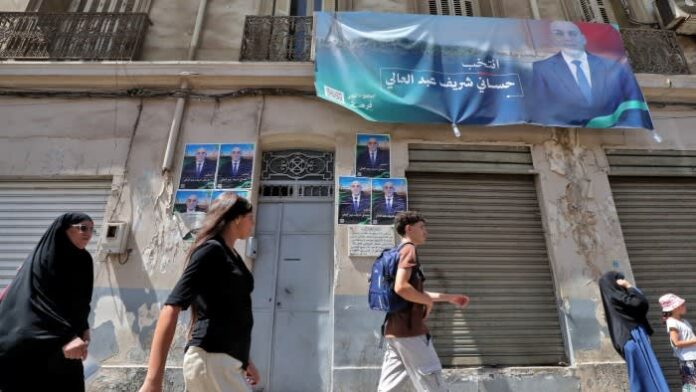Unlock the Editor’s Digest for free
Roula Khalaf, Editor of the FT, selects her favourite stories in this weekly newsletter.
Algeria’s President Abdelmadjid Tebboune has been elected for a second term, giving the authoritarian leader five more years at the helm of the north African gas exporting nation and one of Europe’s key suppliers.
The victory of the 78-year-old incumbent, who won 94.6 per cent of the vote, according to results published by the election authority on Sunday, was widely expected in a country in which the military makes key decisions behind a facade of civilian government. Elections in Algeria are carefully choreographed to ensure the army’s chosen candidate prevails, analysts say.
Tebboune beat two challengers. Youcef Aouchiche, leader of the Socialist Forces Front, which gets most of its support from the Berber-speaking region of Kabilya some 50km east of the capital Algiers, took 2.1 per cent of the vote, while Abdelali Hassani Cherif of the Islamist Movement of Society for Peace, won 3 per cent.
The election followed a lacklustre campaign that featured no debates between candidates and generated little enthusiasm among a predominantly young population, with half of all Algerians aged under 30, analysts and diplomats said.
During his first term, Tebboune presided over one of the harshest crackdowns on dissent in Algeria in decades.
He was elected in a widely boycotted poll in December 2019 after months of leaderless mass demonstrations known as the “Hirak” movement, in which hundreds of thousands took to the streets each week to demand the military-backed regime’s replacement with a democratic civilian government.
The peaceful protests forced the military to oust then president Abdelaziz Bouteflika, who they had backed for a fifth term despite his suffering a stroke in 2013 that kept him largely out of sight for years. Officials and businessmen surrounding Bouteflika were arrested and Tebboune, a regime insider, was presented as the fulfilment of protesters’ demands.
The protests ended in March 2020 when lockdowns were introduced during the coronavirus pandemic, and Tebboune launched a campaign of repression to ensure the demonstrations could not be revived. Hundreds of activists were arrested and laws were amended to enable dissenters to be accused of terrorism. Press freedoms were also curtailed.
Zoubida Assoul, a lawyer and politician, said she had defended hundreds of prisoners of conscience in recent years.
“Things were not rosy under Bouteflika but it was not as bad as it is now,” she said. “I used to be hosted on state channels and was able to criticise the government, but I am now boycotted by the media.”
Raouf Farrah, who works for an international non-governmental organisation, spent nine months in prison in 2023 for commissioning a study on democracy from a journalist. He was accused of publishing secret information to “threaten public order”.
“There is no civil society left,” said Farrah, who is now based in Tunisia. “The most active people have left the country. Those still in Algeria are completely silenced.”
Alongside the crackdown, Tebboune used increased government revenues, as the Ukraine war boosted oil and gas prices, to lift social spending and subsidies in a bid to damp public anger. He also pledged to increase pensions and the minimum wage by 2027 if he was re-elected.
Algeria has one of the world’s least diversified economies, with oil and gas contributing more than 90 per cent of export earnings. Since the Ukraine war, it has become Europe’s second-biggest gas supplier by pipeline, according to the Gas Exporting Countries Forum.
“The fiscal situation has eased somewhat so they are continuing to distribute oil and gas rents,” said Nacer Djabi, sociologist at Algiers university. “It [is] the same populism and focus on the role of the state in the economy that has prevailed for 30 years.”
Almost all everyday commodities are subsidised, a western diplomat noted. Stability in Algeria was “indexed” to the oil price, he said, allowing the state to buy social peace without loosening its grip on political power or the economy.
Tebboune has sought to expand the non-hydrocarbons sector with investments in industry, but these efforts were tightly controlled by a state with a “post-Soviet” mentality, he added.
Riccardo Fabiani, north Africa director at the International Crisis Group, said: “They’re not giving free rein to the business class or foreign investors.”
In the short term, however, the regime was likely to be bolstered with more oil and gas revenue after more than a decade in which international companies had largely shunned what they saw as a difficult country to work in, Fabiani said.
To meet rising demand from Europe as it attempts to replace Russian gas, Italy’s ENI and France’s Total have expanded their investments in Algerian hydrocarbons, while Germany’s VNG AG signed a contract in February to receive piped gas.
“The tide has shifted,” said Fabiani. “Everyone is coming. For the first time, the medium- to long-term economic outlook looks positive. There’s going to be quite a bit of oil and gas coming online in the next few years.”






